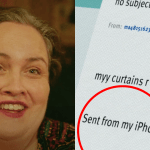
It’s very normal today to move in with your partner before you even think about marriage. In fact, the whole waiting for marriage thing is what’s become unusual. And it makes total sense. You can test out how you really work as a couple, and you can save a hell of a lot of rent/mortgage payments and bills by splitting it between two. But it’s that whole merging of the money thing combined with the ridiculously expensive cities a lot of us live in that can make finances super tricky if the relationship comes to an end.
The possibly ending of thing is, of course, furthest from our minds going into a new living situation. And as a hopeless romantic I really hate to do this, but it shouldn’t be. That doesn’t mean the end of romance, it means being sensible, for both of you.
We asked Helen Baker, financial advisor and author/ founder of On Your Own Two Feet, all the questions you’d want to so you can cover your butt going into a loving cohabitation situation.

What Are Yr First Steps?
You’re all loved up and you’ve decided to move in together. Hurray! You’ve already started apartment hunting and deciding who gets to bring what furniture. You’ve probably even worked out the suburb you’ll live in and restaurants you’ll eat at. But what about your money.
“The key is to go in with your eyes wide open. Make sure you have your own five foundations in place. That is, have emergency funds, spending and investment plans, superannuation, insurance (private health insurance; general insurance (e.g. home, contents, car, jewellery, luxury items, business); and personal insurance), and estate planning all sorted.”
“You can always take some control over your own independence. If the relationship doesn’t break up, then it’s a positive because you are both protected, and if the relationship does end, you are still going to be ok.”
AKA staying in control of your own money doesn’t make you selfish or any less invested in the relationship. It makes you sensible, and that is all. Anyone making you feel otherwise is dead wrong.
“You need to stay in control of your own money and be across your partner’s situation with money,” says Helen, “Keep money separate for a long time. If you are borrowing, then borrow only in your own name even if that means your mortgage gets split. Seek financial advice to put those five foundations in place.”
Does That Mean No Joint Accounts?
Do people still do joint bank accounts? Idk, I’ve been single a long time. But I can see how it looks logical on paper. But is it actually sensible? Helen reckons it depends, but it’s also defs not necessary.
“It’s a better idea to keep finances in your own account and open a joint account for home expenses. When time moves on and it’s clear how each person behaves with money, you can consider merging funds, however, you may not need to.“

Can You Move Onto Their Lease?
It seems fairly common, in my world at least, that often one partner will move into a place the other is already renting, usually if their housemate moves out at a convenient time. For this reason, I’ve had friends who weren’t on the lease at all and others who ended up getting completely stuck in a living situation after the breakup because theirs was the ONLY name on the lease.
Helen says you really need to have a solid set up before you decide if only one of you will be on the lease.
“Whether you are on the lease or not you need to know whether the rent is being paid. You don’t want [your] partner spending the money elsewhere and then you get a rude shock and a bad credit rating if it’s not paid. Or kicked out. And there’s the bond to protect, too.“
Do You Need Written agreements?
Yeah look, it’s kind of in prenup areas without the ring. And it’s totally un-sexy. But it’s SMART. And there’s a lot to be said for being smart even when you’re all drunk on puppy love.
“If one partner has much more than the other it is wise to consider a binding financial agreement once you get a year into the relationship,” suggests Helen, “Generally, issues [in a relationship] can arise at 2 years so planning in advance will help you stay protected, I’ve seen it before.“
And What If You Do Break Up?
No-one moves in with their partner thinking they’ll break up at some point in the future. Right? Please tell me that’s true. But it happens, and when you’ve been living together and the lease isn’t done, that shit can get particularly messy.
Ideally, one person would move out right away, but that just isn’t always plausible. Ending a lease early can result in extra fees and a black mark against your name (unless you’re in an abusive situation, in which case please know there are laws to help you get out immediately and without penalty). It can also be very hard to find a new place within a short time frame.
So what the hell do you do? Sorry but there’s no easy answer here, beyond hopefully having followed the above steps to protect your money.
“In the case of a break-up, you have the option to stay and find someone else to share with or manage on your own, as it regards the lease,” says Helen, “Alternatively, you can exit and both of you wear the re-let fees. You have to weigh up the costs of getting out versus staying. You also need to consider loss of bond, future rent, moving costs, reputation, etc.“
So basically your best chance of not losing money is finding someone new to take over either your part of the lease, or if you stay there to take over your now ex-partners.

When Does De Facto Kick In?
Most of us would know about de facto relationships, but if you don’t it kicks in at the two-year relationship mark and gives you both essentially the same entitlements as a married couple. So yeah, that could help in the case of a messy break up, but Helen says your entitlements still depend on a lot of factors.
“De facto relationships create entitlements at the 2 year mark, even if you are not living together. You are essentially married and entitled to investigate a share in each other’s financial position. What you will be entitled to will depend on answers to a whole list of questions.“
What If You Can’t Afford A Lawyer?
Wouldn’t life be so much easier if we had the kind of cash to just get a lawyer to sort it all out for us? Or, you know, everyone being civil enough in a breakup to not let it get to the point of needing lawyers. But breakups can bring out the worst in even the best people, because emotions, so that’s just not always how it goes. So if it’s getting too intense and you really need the law to get involved but do not have the money for a lawyer, what are your next steps? Helen suggests you keep hold of all the legal documentation.
“You can mediate an outcome and document this on the appropriate legal documentation yourself and have it lodged with the court.“
“However, I still think it is worth getting legal advice because you don’t want someone coming back down the track because you didn’t tie up the loose ends appropriately. Alternatively, you might think you got taken for a ride in mediation because you don’t know what you don’t know.“



